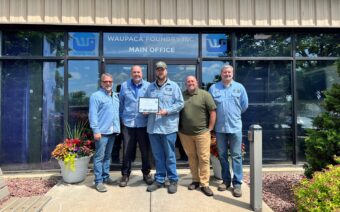
December 2, 2024
GREEN BAY – For the 15th time in 15 years, Green Bay Packaging topped the list of the Wisconsin Sustainable Business Council’s Green Masters Program® participants.
Saying sustainability is “business as usual” for the third-generation, Green Bay-headquartered business, Lisa Bauer-Lotto – corporate director, environment and sustainability with Green Bay Packaging – said, is accurate and on point.
‘A shining example’
Started in 1933, Bauer-Lotto said the family owned, vertically integrated company is dedicated to the innovative development of its products and forestry resources, focusing on safety, sustainability, quality and continuous improvement through its more than 40 facilities in 16 states.
The Wisconsin Sustainable Business Council (WSBC) recently acknowledged Green Bay Packaging (GBP) in several categories, including:
- Top Performer in the Water Resource Management, Manufacturing and Heavy Industrial Category
- Top Performer in the Product Circularity and Life Cycle Management, Manufacturing and Heavy Industrial Category
- Top Performer in the Biodiversity and Ecological Impacts, Manufacturing and Heavy Industrial Category
Jessy Servi Ortiz, executive director of WSBC, said GBP is considered an anchor business by WSBC for its long-term involvement in the Green Masters Program and for illustrating the best of the best in sustainability practices.
“This is a company that has not only participated, but gotten the highest score inside the program, and we recognize them for their dedication and consistency,” she said. “They are a shining example of what is possible in operating a lucrative, successful business in a sustainable manner, as well as designing and delivering products that are sustainable.”
Servi Ortiz said not only has GBP participated in every year of the program, “but is at the top level.”
Bauer-Lotto said GBP is not only on the giving end – sharing insights with other WSBC companies on the value of sustainability integration – but receives value from the Green Masters Program as well.
She said she particularly appreciates the virtual networking sessions with other businesses at different stages of their sustainability journeys.

“Whether you’re a small or large company, innovation comes from different places,” she said. “It’s good to have access to other perspectives on emerging and evolving matters. I’ve always gained some knowledge or insight that we could benefit from (from the program).”
Servi Ortiz said WSBC supports businesses through an array of programming, education, resources and tools – all aimed at being a catalyst for businesses to integrate sustainability into their organizations.
The Green Masters Program, she said, is a tool for defining, prioritizing, measuring and managing a company’s sustainability performance in environmental, social and governance (ESG) topics that are meaningful for an organization and stakeholders.
Servi Ortiz said the program requires each business to think about and measure all aspects of sustainability through a scoring process that aligns with international standards around sustainability.
It then provides a framework for developing or furthering an integrated sustainability program, which she said is essential.
“We like to say we help to move businesses from random acts of environmentalism to a strategic approach,” she said. “The Green Masters Program is both a learning tool and a system development tool for sustainability management.”
Servi Ortiz said the program helps take all the things businesses could be doing – “what they have control over, what their customers care about, what they can measure and what matters to their business” – and measures them in order to improve their sustainability outcomes.
“It then provides a third-party credential that validates their certification mark,” she said. “It’s a really great way for getting companies organized and on the road to an efficient sustainability program.”
Bauer-Lotto said for a company as advanced in its sustainability journey as GBP, the Green Masters Program integration offers other benefits.
“Getting other viewpoints on management and continuous improvement on actions can help us optimize sustainable actions, such as landfill diversion, material capture for recycling and stakeholder engagement,” she said. “The program aligns with GBP sustainability goals and company values, encouraging measures on performance and a feedback loop to apply our learnings for program improvement.”
Bauer-Lotto said the Green Masters Program complements the internal audits (environment and sustainability reviews) GBP performs at most of its facilities every third year.
“Internal reviews focus to identify areas of improvement and innovation but also reinforce best practices within our sustainability pillar, optimizing opportunities at individual plants,” she said. “Through development and measurement of key performance indicators, we see inspiration for further action and can promote competition among peers.”
At GBP, Bauer-Lotto said the sustainability mindset is far-reaching, both operationally and geographically.
The vertically integrated company consists of corrugated container plants, a folding carton facility, recycled and virgin containerboard mills, pressure-sensitive label roll stock plants, timberlands, a paper slitting operation and a sawmill facility.
All of GBP’s entities, she said, are supported by an internal consultancy for sustainability at the corporate level that serves everyone through GBP’s matrixed structure.
“Every division has access to a range of subject matter experts such as environmental engineers and business analysts to assist with sustainability systems, training, best practices and regulatory compliance,” she said.
More companies embrace sustainability
Servi Ortiz said sustainability is now the modern way of doing business, taking several things under the business umbrella into consideration with an ever-present mindset of sustainability. The Green Masters Program, she said, helps businesses understand the scope and tact of their sustainability and sets the stage for other sustainability pursuits.
“We help businesses add value to their businesses so they can fill out Ecovadis (sustainability ranking) and feel good that (their sustainability efforts) are helping to operate their business better,” she said.
Many companies, Servi Ortiz said, are in the early stages of their sustainability journeys – starting with recycling, water use, electricity use, etc. – but they range the gamut.
GBP is on the leading end of the spectrum.
They’re joined by about 200 active WSBC business members in integrating sustainability into their respective business operations rather than simply looking for a “box to check” in terms of their sustainability efforts.
The rationale for doing so, Servi Ortiz said, is strong, as evidenced by the Deloitte 2024 Sustainability Action Report.
It indicates the top drivers for companies to enhance their ESG efforts include:
- Reducing risk (53%)
- Increased efficiencies and return on investment (52%)
- Talent attraction/retention and brand reputation/enhancement (51%)
For GBP, Bauer-Lotto said the rationale started as a key aspect of doing business decades ago.
Business as usual
For GBP, Bauer-Lotto said a focus on environmentalism and sustainability has been entrenched in the operations for decades.
“We were doing sustainability before it became fashionable,” she said. “With our founder, George Kress, being an innovator and inventor, he cultivated a strong culture that continues today. In 1957, GBP started integrating recycled paper, which has evolved into what is today’s 100% recycled mill – a standard that may have seemed unattainable at its innovative onset.”
Bauer-Lotto said GBP manages more than 255,000 acres of family-owned company forest lands.
These, she said, are third-party certified to SFI Standard Principles of Sustainable Forest Management.
In addition, Bauer-Lotto said the company manages an additional 250,000 acres for small landowners.
Collectively, she said the trees in those forests are sourced as part of the fiber that goes into GBP’s paper.
“We’re the only paper company that grows trees on their company lands for vertical integration into our paper,” she said. “The Kresses pride themselves in having a connection between forestry (sustainable wood fiber sourcing) and nature, among the many environmental benefits of forest and tree farming.”
Bauer-Lotto said, in addition, starting in the 1990s, Green Bay operated a 100% recycled mill, with a closed-process water loop, garnering interest and a feature story in National Geographic. In 2008, the Green Bay paper mill was one of the first mills to become Sustainable Forestry Initiative® (SFI®) and Forest Stewardship Council® (FSC®) certified (FSC-C021629).
And in 2021, Bauer-Lotto said GBP kept the momentum going by installing both a closed-process water loop and circular-reclaimed municipal wastewater in its new, $500-million Green Bay mill.
“We reclaim municipal wastewater and use it as an alternate water source, which is unique to GBP’s Green Bay mill,” she said. “While the upfront costs are higher, designing in the technology and innovation at the onset yields valued energy efficiencies and water resilience for our operations in addition to the value-add we provide to our supply chain (customers). Also, this strengthens our position on sustainability and improves operational readiness and alignment with our customers’ sustainability goals.”
A portion of the Green Bay mill make-up process water, Bauer-Lotto said, is piped from the municipal wastewater discharge (NEW Water) with additional treatment for continued use in papermaking.
The reclaimed wastewater, she said, replaces water volume that otherwise would be the city’s freshwater (tap water) supply.
A water system that fully counterbalances its freshwater demand through the use (and reuse) of reclaimed water, Bauer-Lotto said, is known as a “net zero” water system.
The GBP Green Bay Mill, she said, is the first in the world to achieve third-party validation as a net zero water operation, by United Laboratories (UL).
The numbers, Bauer-Lotto said, are impressive.
“In 2023 alone, the innovation of the circular reclaimed water system and advanced technology reduced water use from Lake Michigan by more than 220 million gallons,” she said. “The water system innovation resulted in 30% less water use per ton of paper production at the Green Bay Mill.”

This is particularly notable, Bauer-Lotto said, given that papermaking, by its nature, is very water-intensive.
And yet, she said the overall sustainability performance of the mill investment has reduced impacts by 25% less greenhouse gas, 12% less energy, 30% less water and 33% less waste per ton paper production.
Part of that reduced energy consumption, Bauer-Lotto said, is the result of recovering steam and heat from the manufacturing process and harvesting biogas from an onsite anaerobic digester.
The effluent treatment plant (ETP) on-site treatment of water for reuse in process and prior to return to NEW Water, she said, includes ETP’s capturing of biogas.
Bauer-Lotto said that is used as a renewable electricity fuel for generators that provide on-site renewable electricity.
The efforts at the ETP, she said, recently captured the attention and commendation of the American Forest and Paper Association with an award for Leadership in Sustainability for the greenhouse gas (GHG) reduction at that plant to the tune of 11% less energy used and resulting 35% reduction in GHG emissions per ton of paper produced.
But water and energy, Bauer-Lotto said, aren’t GBP’s only sustainable areas of focus.
GBP has implemented a zero-waste-to-landfill initiative as well, she said, with 99% landfill diversion at participating Northeast Wisconsin sites with the Green Bay shipping container, De Pere shipping container, folding carton and coated products operations participating in the initiative.
“We manage everything and qualify all waste to measure what we’re redirecting,” she said. “This includes inventorying of materials, collection of items at point of generation to be diverted from landfill for recycling, beneficial use or reuse, such as raw material totes with deposit to be returned to the supplier for re-use, and laundering rags and toweling instead of using disposable rags.”
Bauer-Lotto said sustainability permeates every aspect of GBP’s operations, daily practices and capital projects – efforts that begin with leadership support, commitment, prioritization and funding but also needs support from plant managers, sustainability champions and others at the front line.
“They’re the boots on the ground executing practices, and when there’s a need for assistance with a material health assessment, vendor or substitution, they’re the closest to the pulse on action and opportunity,” she said.
Bauer-Lotto said equally important to answering “why” is to also answer “why not” when considering sustainable practices.
“It’s important to look at the whole perspective – the benefits, the pros, the cons and the possibilities on why not, compared to why – because that is part of pioneering a difference, doing things outside the box,” she said. “It may not be easy in the short-term, but worth it in the long term.”
Bauer-Lotto said sustainability is good business for many reasons.
“However, the resounding principle is to do the right thing and be part of actions that make a difference for our customers and the environment,” she said. “We take great pride in being an industry leader in sustainability and are excited about the future. There’s more to look forward to.”
 ‘Reclaiming’ Grand Avenue through retail
‘Reclaiming’ Grand Avenue through retail Turtle Stack Brewery brews a decade of business in La Crosse
Turtle Stack Brewery brews a decade of business in La Crosse







